Related Research Articles

Discrimination is the process of making unfair or prejudicial distinctions between people based on the groups, classes, or other categories to which they belong or are perceived to belong, such as race, gender, age, religion, physical attractiveness or sexual orientation. Discrimination typically leads to groups being unfairly treated on the basis of perceived statuses based on ethnic, racial, gender or religious categories. It involves depriving members of one group of opportunities or privileges that are available to members of another group.

The Congress of Racial Equality (CORE) is an African-American civil rights organization in the United States that played a pivotal role for African Americans in the civil rights movement. Founded in 1942, its stated mission is "to bring about equality for all people regardless of race, creed, sex, age, disability, sexual orientation, religion or ethnic background." To combat discriminatory policies regarding interstate travel, CORE participated in Freedom Rides as college students boarded Greyhound Buses headed for the Deep South. As the influence of the organization grew, so did the number of chapters, eventually expanding all over the country. Despite CORE remaining an active part of the fight for change, some people have noted the lack of organization and functional leadership has led to a decline of participation in social justice.

Daisy Bates was an American civil rights activist, publisher, journalist, and lecturer who played a leading role in the Little Rock Integration Crisis of 1957.

Violence against transgender people includes emotional, physical, sexual, or verbal violence targeted towards transgender people. The term has also been applied to hate speech directed at transgender people and at depictions of transgender people in the media that reinforce negative stereotypes about them. Trans and non-binary gender adolescents can experience bashing in the form of bullying and harassment. When compared to their cisgender peers, trans and non-binary gender youth are at increased risk for victimisation, which has been shown to increase their risk of substance abuse.

The rights of lesbian, gay, bisexual, and transgender (LGBT) people in the U.S. state of Utah have significantly evolved in the 21st century. Protective laws have become increasingly enacted since 2014, despite the state's reputation as socially conservative and highly religious. Utah's anti-sodomy law was invalidated in 2003 by Lawrence v. Texas, and fully repealed by the state legislature in 2019. Same-sex marriage has been legal since the state's ban was ruled unconstitutional by federal courts in 2014. In addition, statewide anti-discrimination laws now cover sexual orientation and gender identity in employment and housing, and the use of conversion therapy on minors is prohibited. In spite of this, there are still a few differences between the treatment of LGBT people and the rest of the population, and the rights of transgender youth are restricted.

The National Organization for Women (NOW) is an American feminist organization. Founded in 1966, it is legally a 501(c)(4) social welfare organization. The organization consists of 550 chapters in all 50 U.S. states and in Washington, D.C. It is the largest feminist organization in the United States with around 500,000 members. NOW is regarded as one of the main liberal feminist organizations in the US, and primarily lobbies for gender equality within the existing political system. NOW campaigns for constitutional equality, economic justice, reproductive rights, LGBTQIA+ rights and racial justice, and against violence against women.

The transgender rights movement is a movement to promote the legal status of transgender people and to eliminate discrimination and violence against transgender people regarding housing, employment, public accommodations, education, and health care. A major goal of transgender activism is to allow changes to identification documents to conform with a person's current gender identity without the need for gender-affirming surgery or any medical requirements, which is known as gender self-identification. It is part of the broader LGBT rights movements.
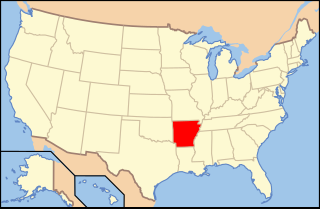
Lesbian, gay, bisexual, and transgender (LGBT) persons in the U.S. state of Arkansas face legal challenges not experienced by non-LGBT residents. Same-sex sexual activity is legal in Arkansas. Same-sex marriage became briefly legal through a court ruling on May 9, 2014, subject to court stays and appeals. In June 2015, the U.S. Supreme Court ruled in Obergefell v. Hodges that laws banning same-sex marriage are unconstitutional, legalizing same-sex marriage in the United States nationwide including in Arkansas. Nonetheless, discrimination on the basis of sexual orientation and gender identity was not banned in Arkansas until the Supreme Court banned it nationwide in Bostock v. Clayton County in 2020.

Lesbian, gay, bisexual, and transgender (LGBT) people in the U.S. state of Indiana enjoy most of the same rights as non-LGBT people. Same-sex marriage has been legal in Indiana since October 6, 2014, when the U.S. Supreme Court refused to consider an appeal in the case of Baskin v. Bogan.
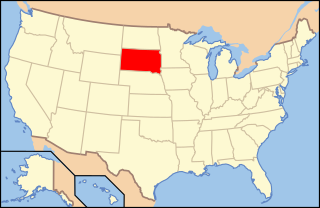
Lesbian, gay, bisexual, and transgender (LGBT) people in the U.S. state of South Dakota may face some legal challenges not experienced by non-LGBT residents. Same-sex sexual activity is legal in South Dakota, and same-sex marriages have been recognized since June 2015 as a result of Obergefell v. Hodges. State statutes do not address discrimination on account of sexual orientation or gender identity; however, the U.S. Supreme Court's ruling in Bostock v. Clayton County established that employment discrimination against LGBT people is illegal under federal law.

Lesbian, gay, bisexual, and transgender (LGBT) persons in the U.S. commonwealth of Kentucky still face some legal challenges not experienced by other people. Same-sex sexual activity is legal in Kentucky, although the state legislature has not repealed its sodomy statute for same-sex couples. Same-sex marriage is legal in Kentucky under the U.S. Supreme Court ruling in Obergefell v. Hodges. The decision, which struck down Kentucky's statutory and constitutional bans on same-sex marriages and all other same-sex marriage bans elsewhere in the country, was handed down on June 26, 2015.
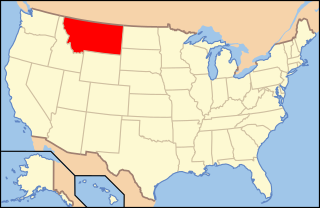
Lesbian, gay, bisexual, and transgender (LGBT) people in the U.S. state of Montana may face some legal challenges not experienced by non-LGBT residents. Same-sex sexual activity has been legal in Montana since 1997. Same-sex couples and families headed by same-sex couples are eligible for all of the protections available to opposite-sex married couples, as same-sex marriage has been recognized since November 2014. State statutes do not address discrimination on the basis of sexual orientation and gender identity; however, the U.S. Supreme Court's ruling in Bostock v. Clayton County established that employment discrimination against LGBT people is illegal under federal law. A number of cities also provide protections in housing and public accommodations.
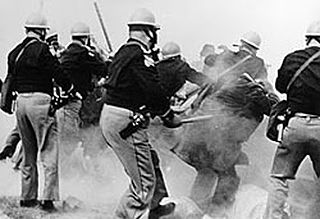
Discrimination comprises "base or the basis of class or category without regard to individual merit, especially to show prejudice on the basis of ethnicity, gender, or a similar social factor". This term is used to highlight the difference in treatment between members of different groups when one group is intentionally singled out and treated worse, or not given the same opportunities. Attitudes toward minorities have been marked by discrimination in the history of the United States. Many forms of discrimination have come to be recognized in American society, particularly on the basis of national origin, race and ethnicity, non-English languages, religion, gender, and sexual orientation.
Until 2017, laws related to LGBTQ+ couples adopting children varied by state. Some states granted full adoption rights to same-sex couples, while others banned same-sex adoption or only allowed one partner in a same-sex relationship to adopt the biological child of the other.
South Africa is a secular state, with freedom of religion enshrined in the Constitution.

American Muslims often face Islamophobia and racialization due to stereotypes and generalizations ascribed to them. Due to this, Islamophobia is both a product of and a contributor to the United States' racial ideology, which is founded on socially constructed categories of profiled features, or how people seem.
Indiana Senate Bill 101, titled the Religious Freedom Restoration Act (RFRA), is a law in the U.S. state of Indiana, which allows individuals and companies to assert as a defense in legal proceedings that their exercise of religion has been, or is likely to be, substantially burdened.
Arkansas HB 1228, also known as the Conscience Protection Act and the Religious Freedom Restoration Act, is a law in the state of Arkansas that aims to increase "judicial scrutiny" in cases involving religious beliefs. Opponents of the law say that it will allow for lawful discrimination of LGBT people. The law was passed by the Arkansas Senate on March 31, 2015. The next day, Governor Asa Hutchinson announced he would not sign the bill as written, instructing the legislature to make changes to its language. The final version was passed and signed into law as Act 975.

The Equality Act was a bill in the United States Congress, that, if passed, would amend the Civil Rights Act of 1964 to prohibit discrimination on the basis of sex, sexual orientation and gender identity in employment, housing, public accommodations, education, federally funded programs, credit, and jury service. The Supreme Court's June 2020 ruling in Bostock v. Clayton County protects gay and transgender people in matters of employment, but not in other respects. The Bostock ruling also covered the Altitude Express and Harris Funeral Homes cases.
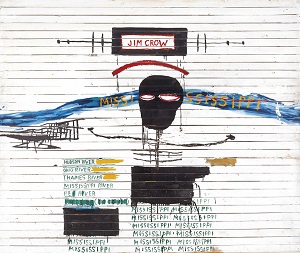
Jim Crow is a painting created by American artist Jean-Michel Basquiat in 1986. In October 2017, the anti-segregation painting sold for $17.7 million at Christie's Post-War & Contemporary art auction in Paris, becoming the most expensive artwork by Basquiat sold in France.
References
- 1 2 3 O'Neal, Rachel (May 10, 2020). "Artist V. L. Cox Opens Doors to Let Everyone In". Arkansas Democrat-Gazette, High Profile Section. Retrieved May 1, 2021.
- 1 2 "About page of Website of V. L. Cox". V. L. Cox. Retrieved May 1, 2021.
- ↑ "Encyclopedia of Arkansas". Encyclopedia of Arkansas. Retrieved May 21, 2021.
- ↑ Barth, Jay. "Act 975 of 2015 (a.k.a. Religious Freedom Restoration Act)". Encyclopedia of Arkansas. Retrieved May 1, 2021.
- ↑ Peacock, Leslie (March 6, 2016). "V. L. Cox's 'Murder of Crows' Tackles Hate Head On". Arkansas Times. Retrieved May 1, 2021.
- ↑ Sharp, Sarah Rose (September 8, 2020). "An Orwell-inspired Billboard Project Considers the State of US Politics". Hyperallergic. Retrieved May 1, 2021.